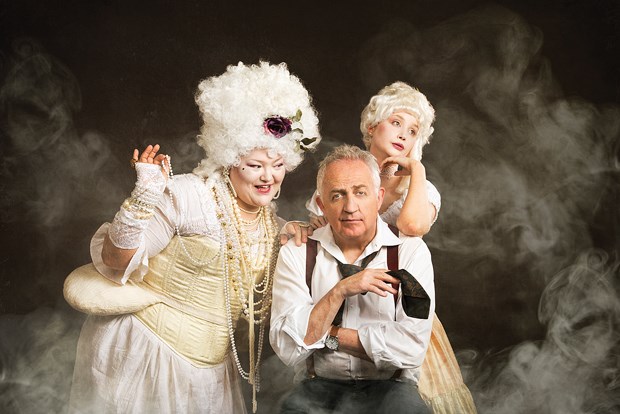The Lost Operas of Mozart, Christ Church Cathedral (690 Burrard St.), Oct. 27, 28 and 29, 8 p.m. Tickets: $48 (includes taxes and charges). General Admission. Available online at lostoperas.brownpapertickets.com, in person at Sikora’s Classical Records, 432 West Hastings St., and at the door. For more information visit cityoperavancouver.com.
Marshall McLuhan once said he only read pages on the right side of the book.
By forgoing half the text, the media guru’s inestimable noodle came alive with the challenge of filling in the blank spots he’d created.
McLuhan – who has no further business in this article – likely would have been fascinated with the artistic nether world described in The Lost Operas of Mozart.
The tale imagines a place where every unfinished piece of art goes to moulder. The Canterbury Tales are down there, and so is The Mystery of Edwin Drood. Your father’s basement with wood panelling on two of the walls is probably there, along with Tupac Shakur albums, that Bruce Lee movie where he fights Kareem Abdul-Jabar, and Orson Welles movies. Lots of Orson Welles movies, lingering in the limbo that lets procrastinators finally rest.
Mozart graced the art-filled abyss with three unfinished operas: Lo sposo deluso, L’oca del Cairo and Zaïde.
Those compositions feature prominently in a story about “abandonment and unrealized dreams,” explains playwright Maria Reva.
“It’s a comedy but there are also some dark notes in it,” she says.
The story begins with an impresario, played by Vancouver Symphony Orchestra conductor Bramwell Tovey, being visited by three spirits – each one a soprano. Before long, the office fills with Marx Brothers-like rapidity as a bass, tenor, and baritone bargain, beg and badger the impresario for a chance to sing.
Over 230 years of rehearsal, some feelings of abandonment have fomented, Reva explains. Each singer feels forsaken by their creator, not unlike Frankenstein, or the characters in an Ingmar Bergman movie.
The idea sprang from the mind of the play’s director, Alan Corbishley, leaving Reva to fashion a “connective tissue” that would unite the unfinished operas.
Combining three operas – two Italian and one German, one involving a mechanical goose and another featuring a spurned sultan – into a cohesive story was challenging, Reva reports.
While the mechanical goose “unfortunately” isn’t part of the show, that goose was part of Reva’s reasons for taking the job.
“It just seemed so whimsical and wonderful,” she says.
Working on the libretto allowed Reva to examine Mozart in a new light and explore why he abandoned what by some accounts was very promising work.
In the case of Zaïde, which might have been a dark tale of jealousy, Reva suspects Mozart felt comedy-loving Viennese audiences would prefer something lighter on blight and heavier on buffa.
For Lo sposo deluso, his decision to stop writing likely stemmed from difficulty securing financing, as the opera was never actually commissioned, according to Reva.
Born in Ukraine, Reva says she wrote the book for The Lost Operas of Mozart in three weeks and one year. The first three weeks were an intense flurry at her laptop. The following year was devoted to workshops and revisions.
The Vancouver writer, who’s currently working on a collection of short stories while earning a master of fine arts in fiction and playwriting in Austin, TX., says the production was important in taking her from the comfort of her writing room.
When she writes prose the audience feels like it exists on the other side of a wall, she explains. In workshopping a story for the stage, the wall crumbles and the audience is “right there.”



